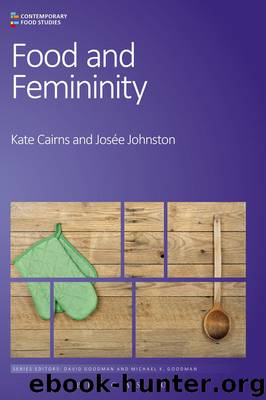Food and Femininity by Cairns Kate & Johnston Josée

Author:Cairns, Kate & Johnston, Josée
Language: eng
Format: epub
ISBN: 9780857855565
Publisher: Bloomsbury Publishing
Published: 2015-09-23T16:00:00+00:00
Control and class: “Poor people . . . should know better”
Sociological scholarship shows that food has immense cultural significance as a marker of status (e.g., Bourdieu 1984; Warde and Martens 2000; see Chapter 2, this volume). Critical food scholars have demonstrated how the “good,” controlled, educated eating practices of reputable middle-class consumers are often defined in opposition to “the knowledge poverty of the working class” (Hollows and Jones 2010: 309; see also Guthman 2003; Johnston, Szabo, and Rodney 2011). During focus groups and interviews, class boundaries were often articulated in relation to the uninformed consumer who eats unhealthy processed food. “I have a hard time when poor people, like, they should know better not to eat Dominoes [Pizza], you know, go to the corner store and have Cocoa Puffs or something,” said Cassandra (31, white, film industry). “Come on, chocolate milk on your cereal is not good,” she continued with a laugh. “But when it’s all you have and when it’s all you’re raised on, I guess you, how do you determine, like if your mom came home with KFC every night.” Cassandra criticizes the unhealthy food choices she associates with a classed upbringing characterized by a lack of food knowledge required to practice appropriate self-control. Her explicit naming of class was less common than statements in which class was coded through particular food choices. Alyssa lamented “people who have eaten Beefaroni for dinner and wonder why they get,” she paused, considering her words. “I was going to say cancer, but that’s a really bad thing. Really intense. But we wonder why all these diseases are all over the place.” Although Alyssa did not name class outright, her reference to Beefaroni invokes inexpensive, processed foods commonly associated with an unhealthy working-class consumer (Guthman 2003). As Alyssa continued, she emphasized the individual responsibility of making informed food choices in order to control one’s health:
People are like, oh I am so tired. Well, what did you eat for breakfast? . . . I am not a judgmental person, but when people are like, they’ve got a shopping cart full of meat, like hotdogs, whatever, it’s just like, if you want to have this conversation, I will have it. Let’s sit down and watch a documentary, or let’s google with me. I will do it with you. But the choice is yours.
Once again, class is signaled through the reference to a particular food product (hotdogs) that symbolizes an uninformed consumer who is unable to control themself in a food system filled with tempting but unhealthy foods. Alyssa offers to educate this unhealthy Other, implying that individual ignorance and lack of control are the key obstacles to healthy living.
These examples demonstrate how the do-diet narrative of personal empowerment through individual self-control supports a classed and neoliberal conception of health as the deserved outcome of individuals’ educated food decisions. “We have to make better choices, and not let the environment control our decisions,” said Li (47, Chinese Canadian, life coach). Even as Li argued for
Download
This site does not store any files on its server. We only index and link to content provided by other sites. Please contact the content providers to delete copyright contents if any and email us, we'll remove relevant links or contents immediately.
The Rules Do Not Apply by Ariel Levy(4969)
On the Front Line with the Women Who Fight Back by Stacey Dooley(4872)
The Lonely City by Olivia Laing(4801)
Bluets by Maggie Nelson(4556)
The Confidence Code by Katty Kay(4260)
Three Women by Lisa Taddeo(3433)
Not a Diet Book by James Smith(3425)
Inferior by Angela Saini(3313)
Confessions of a Video Vixen by Karrine Steffans(3308)
A Woman Makes a Plan by Maye Musk(3254)
Pledged by Alexandra Robbins(3177)
Wild Words from Wild Women by Stephens Autumn(3153)
Nice Girls Don't Get the Corner Office by Lois P. Frankel(3044)
Brave by Rose McGowan(2823)
Women & Power by Mary Beard(2767)
Why I Am Not a Feminist by Jessa Crispin(2760)
The Girl in the Spider's Web: A Lisbeth Salander novel, continuing Stieg Larsson's Millennium Series by Lagercrantz David(2721)
The Clitoral Truth: The Secret World at Your Fingertips by Rebecca Chalker(2720)
I Who Have Never Known Men by Jacqueline Harpman(2669)
